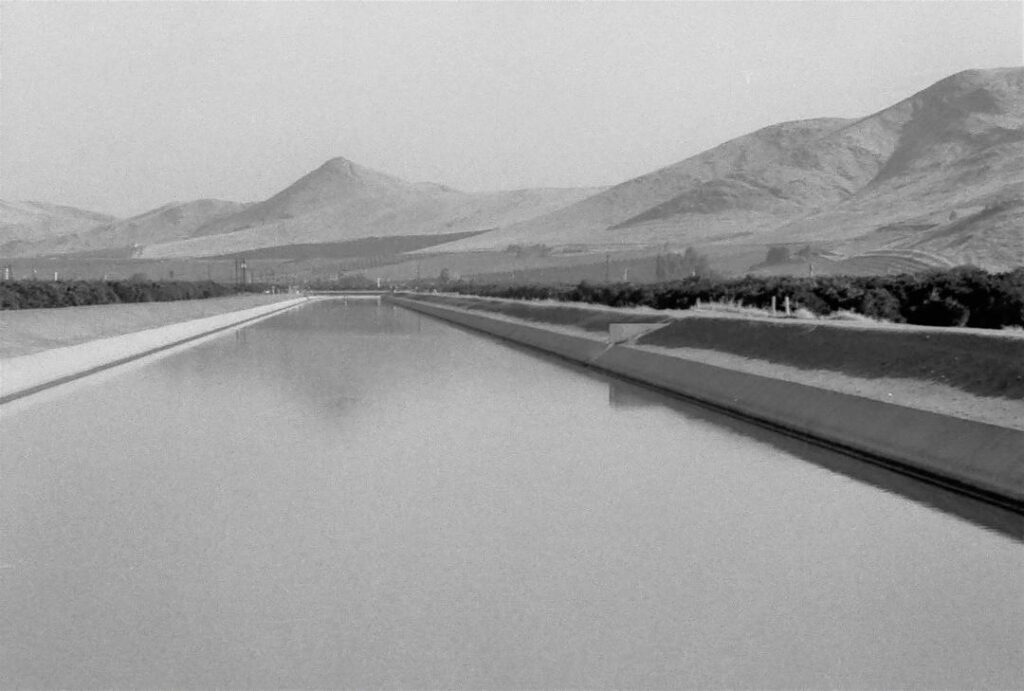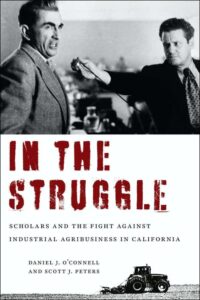In late 1975, while at UC Berkeley, I was guided into the path of a prophet, Paul Schuster Taylor. Retired Professor of Economics at UC, widower of the renown documentary photographer Dorothea Lange, longstanding critic of California’s large-scale agricultural structure and its historic political power over the state’s water resources and farm labor conditions – Paul was a force even at 80, when hindered by Parkinson’s and glaucoma. I was drawn to him like a moth to the back porch light, but rather than dashed to pieces by the encounter, I was reclaimed.
The rest of the story isn’t exactly history, as we say, because I am still digging Paul’s trenches. But the history is important, and that’s what the new book by Daniel J. O’Connell and Scott J. Peters provides: the story of a storm in which many people were struck by Paul’s lightning and went on to contribute their energies to the struggle for the common good.

In the Struggle begins with one of Paul’s students, Walter Goldschmidt, himself renowned for conducting two studies on the effects of large landholdings on small town development. After revisiting Paul’s history of battling first the Germans, then the political empire of agribusiness, the book narrates the stories of Ernesto Galarza (Stanford scholar famous for his war on the Bracero Program), Isao Fujimoto and Dean MacCannell at UC Davis (rural sociologists who undertook updates of Goldschmidt’s findings at the macro level) and Don Villarejo (who left the field of experimental physics to build the non-profit Institute for Rural Studies, which challenged the UC system for its bias toward mechanized, industrial agriculture and conducted studies on labor, water and farm size for years).
 It also includes chapters on my efforts (especially since moving into the Tulare Basin almost 30 years ago to spread the good news) and those of newcomer Janaki Jagannath, a protégé of Fujimoto’s who went to law school and then helped organize the Fresno County communities of Cantua Creek and El Porvenir to receive decent drinking water.
It also includes chapters on my efforts (especially since moving into the Tulare Basin almost 30 years ago to spread the good news) and those of newcomer Janaki Jagannath, a protégé of Fujimoto’s who went to law school and then helped organize the Fresno County communities of Cantua Creek and El Porvenir to receive decent drinking water.
These are only a few of the lightning bolts from the ongoing, eternal storm over the Valley’s water and land, but their stories, taken together, show us much about what we face in the next few years and how we should enter the struggle. We are also reading, between the lines, the story of yet another lightning strike “victim,” Dan O’Connell himself, who directs Fresno’s Central Valley Partnership, a progressive network of labor unions, environmental organizations, and community groups spanning the San Joaquin Valley.
If you’ve never heard of Paul Taylor, however, or any of these other soldiers of the common good, you will find the portrayals of them helpful introductions to the real battle at hand. As Paul wrote at the end of his first article on the Central Valley Project, published in 1949 before construction had even begun:
“Citizens of the Valley have not learned the crucial importance to their own future of the work of their own local water districts. . . . The character of communities to be created is in the hands of the people of the Valley, and of the Congress.”
The battle over water and land is at hand, and our hands are needed. Nothing will improve if we don’t engage. Reading this book would be a good starting point.
In the Struggle: Scholars and the Fight against Industrial Agribusiness in California can be obtained by contacting the publisher at https://nyupress.org/9781613321225/in-the-struggle/. The price is $24.95 plus tax and shipping.
———————————————————–
Trudy Wischemann is a writer and a columnist for The Foothills Sun-Gazette, which admirably serves the small citrus-belt towns of Tulare County. You can view her column “Notes from Home” at www.thesungazette.com. She is also compiling a volume of writings on California Agriculture and the Common Good to be published next year through West of West Books.

Really looking forward to learning the true history of how on earth Industrial Agriculture has continued to have its way in this Valley. Surely the same “Struggle”, as is brought forth in this recommended book, has been visited upon all land converted over to Industrialization. We need to know our history or remain in the dark. I think it very fitting to know what others have been up against, because we can no longer agree to it.
Industrial AgriBusiness is a bonafide curse on our land. It has eroded our soil into mere dirt, lacking practically all signs of crucial microbial life, now requiring toxic imputs in order to grow much of anything, wasting precious water as it evaporates and runs off the surface rather than absorbing, taking with it all sorts of foul chemicals tainting other lands and other water sources, as the spoiled land is no longer able to absorb the moisture as it once did.
If one truly wants to know how farming can be done to Regenerate the dirt, back to soil that is alive and able to sequester carbon, as well as absorb water, while using alot less water, rather than continue wasting and poisoning water, their are, also, many books available to show how abused farmland can be transformed. There are even ways to bring back the water ways, that have been sucked dry, in order to rehydrate lands.
Citizens of the Valley do not have to helplessly remain at the mercy of the Industrial Complex of Big Ag. Read and pray your way to freedom…
Hey, Root – Thanks for commenting. I just started reading Wes Jackson’s work, one of the pioneers of no-till ag, sustainable farming, small farms, and – YES – praying with our lives. If you’ve avoided reading him as long as I have, you’ve made the same mistake!!! What a soul on fire, defender of dirt.
I have avoided looking at the Valley Citizen due to overload of emails. It appears I have missed a lot worth reading.
WELCOME, DIANE M KROEZE
LETS KEEP THE VALLEY CITIZEN WELL WORTH READING…